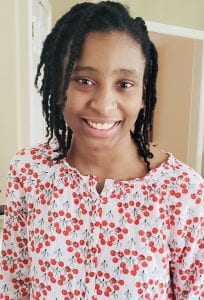Nandhini Nadarajan
 Nandhini Nadarajan is a sophomore at Georgia State University, majoring in Psychology with a pre-med concentration. She is a member of Psi Chi, an honor society in Psychology, and volunteers at the Lanette L. Suttles Child Development Center at GSU. Currently at Dr. King’s Developmental Clinical Neuropsychology Across the Lifespan (DNP-ATL) Lab, she is working as an undergraduate research assistant to gain experience in a research setting as well as further her knowledge of brain functioning and its relation to behaviors through the usage of neuroimaging. Her goal is to go to medical school with interests in psychiatry and pediatrics. Apart from college and lab, she enjoys singing, long car drives, traveling, and exploring new places with her friends and family.
Nandhini Nadarajan is a sophomore at Georgia State University, majoring in Psychology with a pre-med concentration. She is a member of Psi Chi, an honor society in Psychology, and volunteers at the Lanette L. Suttles Child Development Center at GSU. Currently at Dr. King’s Developmental Clinical Neuropsychology Across the Lifespan (DNP-ATL) Lab, she is working as an undergraduate research assistant to gain experience in a research setting as well as further her knowledge of brain functioning and its relation to behaviors through the usage of neuroimaging. Her goal is to go to medical school with interests in psychiatry and pediatrics. Apart from college and lab, she enjoys singing, long car drives, traveling, and exploring new places with her friends and family.
Sedi Ejuoneatse-Clarke
 Sedi is a sophomore at Georgia State University Honors College, currently majoring in Neuroscience with a pre-med concentration. She’s a research assistant at Dr. King’s Developmental Clinical Neuropsychology Across the Lifespan (DNP-ATL) Lab, and eager to expand her interests in cognitive sciences and study the effects of brain tumors. Sedi hopes to use this opportunity to further her education and aspirations of practicing medicine in the future. In her free time, she enjoys reading, puzzles, listening to music, and spending time with her friends and family.
Sedi is a sophomore at Georgia State University Honors College, currently majoring in Neuroscience with a pre-med concentration. She’s a research assistant at Dr. King’s Developmental Clinical Neuropsychology Across the Lifespan (DNP-ATL) Lab, and eager to expand her interests in cognitive sciences and study the effects of brain tumors. Sedi hopes to use this opportunity to further her education and aspirations of practicing medicine in the future. In her free time, she enjoys reading, puzzles, listening to music, and spending time with her friends and family.
Kylie Szymanski

Kylie is a senior psychology major studying how neuropsychological disruptions impact the brain, behavior, and cognition across the lifespan using neuroimaging techniques and neuropsychological assessments. As a Brains & Behavior scholar, she examined the relationship between task-switching and adaptive functioning in survivors of pediatric brain tumors. Kylie is currently researching resting-state functional connectivity and intelligence in adolescents and young adults with congenital heart disease and their peers. She is also a research assistant on the Healthy Student Brain study, which investigates the biopsychosocial factors associated with neurocognitive health in college students. Kylie aspires to continue researching the determinants of neuropsychological abilities by pursuing a graduate program in clinical psychology.”
Weston Rowe

Weston Rowe is a Junior at Georgia State University, pursuing a B.S. in psychology with a minor in biology. With an interest in psychometrics and the structural-functional relationships underlying cognition, he has been thrilled to contribute to the DNP-ATL Lab while gaining experience in the numerous dimensions of research. This fall, he will be assisting as part of the data acquisition team for the Healthy Brains Study. Upon graduation, he plans to pursue a graduate degree and a career in the medical sciences. He enjoys graphic design, backpacking, and spending time with friends and family in his free time.
Shirley Ortega
 Shirley is a junior in the Honors College program at Georgia State University, majoring in psychology with a minor in neuroscience. She is a Goizueta Foundation Leadership Pipeline Scholarship recipient. Shirley is delighted to broaden her interests in neuropsychology by analyzing the behavioral and cognitive repercussions of children who have had specific health challenges in Dr. King’s Developmental Clinical Neuropsychology Across the Lifespan (DNP-ATL) Lab. Shirley joined this lab to strengthen her overall research abilities and, in particular, to learn more about brain function in the lab environment. Apart from academics, Shirley enjoys hiking, rollerblading, and playing tennis.
Shirley is a junior in the Honors College program at Georgia State University, majoring in psychology with a minor in neuroscience. She is a Goizueta Foundation Leadership Pipeline Scholarship recipient. Shirley is delighted to broaden her interests in neuropsychology by analyzing the behavioral and cognitive repercussions of children who have had specific health challenges in Dr. King’s Developmental Clinical Neuropsychology Across the Lifespan (DNP-ATL) Lab. Shirley joined this lab to strengthen her overall research abilities and, in particular, to learn more about brain function in the lab environment. Apart from academics, Shirley enjoys hiking, rollerblading, and playing tennis.
Allison Lipstein

Allison Lipstein and is a junior at GSU pursuing a bachelor’s degree in psychology with a minor in neuroscience. She is an active member of the collegiate neuroscience society and a student assistant for the Gaucher Molecular Biology group at GSU. Her goal is to attend a graduate school for neuroscience or neuropsychology and become a research scientist. She has always loved working in labs and attended a magnet school named the Academy of Science Research and Medicine at Paulding County High School where she was able to gain a certificate of completion in biotechnology. She is excited to use this opportunity of working with the King Lab to explore the ins and outs of the nervous system and find a research topic that interests her to develop further. Outside of school and the lab, Allison loves to listen to music, paint and hang out with her cats
Micaela Merrill – Intern Student
 Micaela Merrill is a full time student at Truman State University, class of 2024, studying interdisciplinary neuroscience. She is currently working in Dr. King’s lab this summer for the Georgia Tech/Georgia State Neuroscience REU internship program. Micaela’s project explores how differences in the white matter microstructure of the cingulum may be associated with PTSD using deterministic tractography.
Micaela Merrill is a full time student at Truman State University, class of 2024, studying interdisciplinary neuroscience. She is currently working in Dr. King’s lab this summer for the Georgia Tech/Georgia State Neuroscience REU internship program. Micaela’s project explores how differences in the white matter microstructure of the cingulum may be associated with PTSD using deterministic tractography.